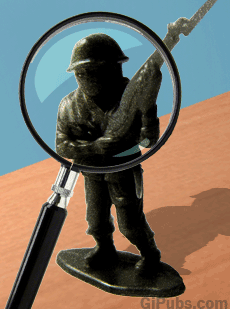You describe a situation many leaders face at some point in their career. Your frustration is normal. You are up against a difficult problem and it is testing your skills and resolve as a leader.
My answer will revolve around personal experience and reflection. While the Army is not a repository for misfits, our ranks are filled with individuals from all walks of life with varying degrees of competency. While I believe in discipline and correcting substandard performance, my methods have changed significantly as I have grown older and gained additional experience.
Take an objective look

Start by looking at the Soldier in a new light
First, you must realize that this person is who he is based on his life experience. Some learn at different rates and some grew up in environments totally different than anything you or I could ever imagine. Many times this results in Soldiers feeling isolated. This feeling may be as a result of how they relate with others or that they just don’t fit in with the majority. You have a leadership challenge in front of you that can define who you are as a leader. You can choose to take the standard approach or you can choose to confront this matter head-on and make a difference. The latter will not only require work on your part but a desire on the part of the Soldier. I venture to say that it will be a more rewarding and positive approach for both of you.
Identify the specific problems
You must establish trust with the Soldier. He needs to know that you sincerely care. You cannot do this if the Soldier knows you are going to talk behind his back or otherwise breach his trust. Before you have your initial conversation I would encourage you to do the following:
- Sit down a make a list of the issues: hygiene, failure to follow instructions, inability to comprehend. Remove all your emotion from this process look at the facts.
- Look at his ERB and see what his aptitude test score are. If they are extremely low it could be an indicator that he has a learning disability.
- Consider speaking with a member of the mental health clinic at your local medical facility. Do not use names, ranks, unit or any other identifying information. Your goal is to see if there could be other factors influencing this Soldier’s behavior that are not readily apparent.
- Ask yourself a few questions: Can the Soldier read well? What is his ability to understand simple instructions? Does the Soldier appear to be depressed? How does the Soldier interact with others? Is he a loner or does he try hard to be accepted into the group? Does the group treat him poorly?
Once you have listed the behaviors and researched the issues it is time to sit down with the Soldier. Remember this meeting is important because it will be an attempt to restart your relationship. It cannot be directive, it must be Soldier-centered and focused on getting him to open up.
Meet with the Soldier

Prepare a solid plan to help your Soldier improve before you set off on the wrong track
Talk to the Soldier and let them know the purpose of the session. Let him know you care. Explain your concerns and ask him to help you understand why he is having difficulty. You should also understand that by asking these questions the Soldier may be very embarrassed and it may be difficult for him to talk about these things. Your job is to encourage him to talk and to work through the issue. He will speak with you when he knows you care and he can trust you. This may take time and patience on your part.
The Soldier also needs to understand that continued substandard performance could result in separation. Is this what the Soldier wants? Ask him. If the Soldier wants to stay in the Army explain to him that you are trying to help him stay in the Army and become a highly successful Soldier. This can only happen if the Soldier wants to try. You must also understand that Soldiers who have these issues are knocked down pretty easily so you may have to give him some cover from the other troops while he builds up his self confidence and self esteem.
Take time to form a solid plan
Take the information you gain out of the counseling session and think about it over the weekend and come up with your plan. You may have to begin an education plan that starts at the basics: Why is it important to stay clean? Being dirty can cause others in the unit to get sick. Then move on to basic communication skills, Soldier skills, etc.
I know this may sound wacko but to be honest some Soldiers have problems they are dealing with that you will never know about unless you can get them to trust you and talk with you. The goal is that by putting this plan of action together you can transform this individual into a Soldier who can be part of the team.
Helping problem subordinates is your job and your duty

Use positive reinforcement techniques when opportunities arise, but demand Soldiers maintain Army standards at all times.
While I understand your frustration, I see a Soldier wanting help but not knowing what to do. You have the opportunity to build a person into a Soldier and transform someone’s life. It will not be easy and the Soldier must be willing to travel the road with you. Remember, a lot of people have probably given up on this kid before–he may have given up on himself.
If the Soldier improves, encourage him. If there is no change and he has no desire to change, you will need to consider separation or a bar to reenlistment. Before you venture down that road, I would encourage you to step forward as a leader and help this individual become a better Soldier and more effective human. If you are successful, you will have proven yourself a leader when others gave up and this Soldier will be forever grateful and loyal to you. It will be a life changing experience for him that he will not forget.
I have seen these situations in the past. I made some mistakes, but I also had a leader who showed me the correct way to change performance in individuals like this by showing you care. His way was the right way. I have never forgotten the Soldiers I helped, but more importantly I will never forget the Soldier I did not help.
Given him a chance, treat him like you want to be treated, look at the situation from his perspective, and come up with a plan that teaches him, encourages him, and holds him to the standard.
Read The Mentor: Everything you need to know about leadership and counseling for more information about Counseling, Leadership, Corrective Training, and Separations in the Army.















Comments
Turner
Top,
This is the most wholesome and magnanimous thing I have ever heard an Enlisted-man say. You sir deserve kudos for this FAQ. Congratulations on truly hitting it on the head. It is the NCO’s job to help this soldier, and not only that, but to be decent to him as a fellow human being. It is part of this NCO’s creed and Army Value system. Kudos to you for this wonderful advice!